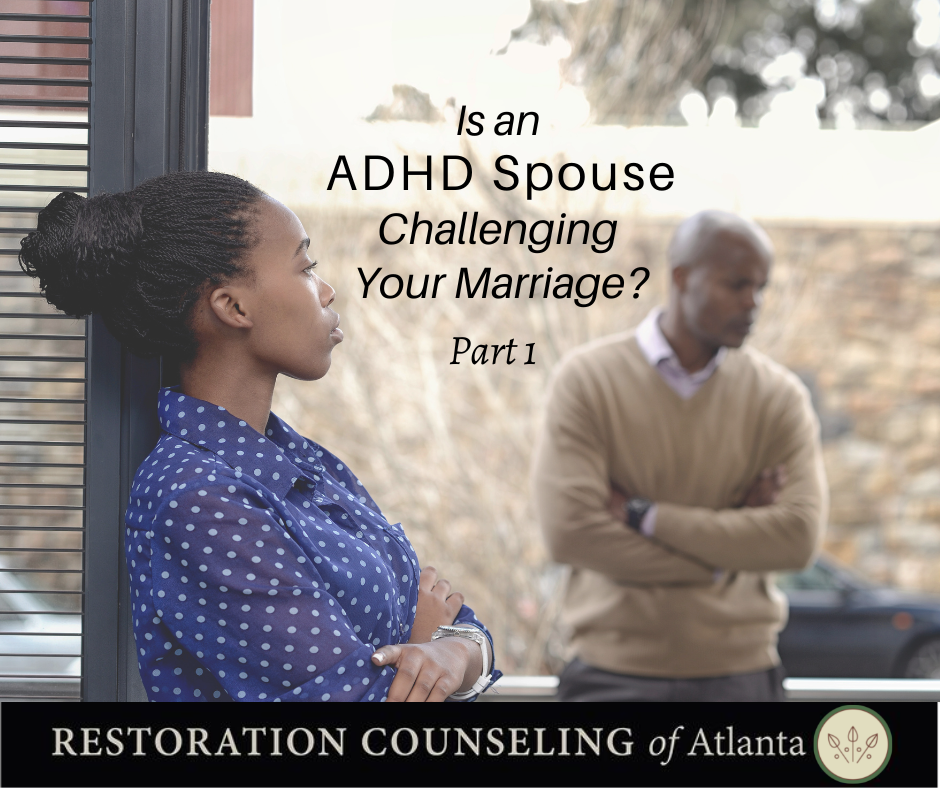Part 1
Discovering new things about your spouse is one of the most exciting things about getting married. You learn more about what they like, have fun together, and enjoy seeing the world from another person’s perspective. After a time, those initially inviting differences may become more difficult to manage, and sometimes they create significant conflict. If you or your spouse has ADHD (see this definition), it can increase those tensions and create opportunities to navigate challenges.
Symptoms of ADHD
Dr. Hallowell explains research data from Barkley et al. and states that the following symptoms show a picture of ADHD. It’s good to remember that not everyone with ADHD will have all these symptoms or at the same level of severity. Following are just some of the possible struggles.
- A sense of underachievement and insecurity (regardless of how accomplished you are)
- Difficulty getting organized
- Chronic procrastination or trouble getting started
- Many projects are going on simultaneously, and there is a problem with follow-through
- Easily distracted, with a tendency to drift off
- An intolerance of boredom
- Impatience, low tolerance for frustration
- Impulsivity, verbally or in action, often regarding money
- Mood swings
- Physical or cognitive restlessness
- The tendency toward addictive behavior
- Frequent search for high stimulation, a tendency to be a maverick
- Inaccurate self-observation
Challenges of ADHD
When one of the spouses has ADHD, any of the following challenges can cause tension, disagreement, or significant conflict. Do you notice any of these present in your relationship?
- Energy and Speed: The speed of thinking and the energy an ADHD person puts forward on new things can be exciting at first. However, it can be frustrating when that energy isn’t focused on your relationship but on other points of interest or distractions.
- Impulse Control: ADHD brains are like race cars without good brakes. They can get carried away with spending too much, driving too fast, and sharing too much.
- Now and Not Now: ADHD people tend to be very present-focused and often forget or lack awareness about future things or things that happened in the past.
- Emotional Hyper Arousal: This can look like excessive emotional responses that are hard for the person to regulate, such as anger or strong emotions. They struggle with how much they share or display and how to regulate those feelings.
- Planning: When planning involves organizing and anticipating what needs to happen or tasks to be done, some ADHD people struggle.
- Perspectives on Time: ADHD people frequently struggle with having an accurate sense of time. They lose perspective on time because they become engrossed and hyper-focused on something or struggle to start a particular task. Their relationship with time is fluid having both fast and slow parts in any given situation.
- How Information Comes In: ADHD brains collect many types of information simultaneously with no system to organize all the incoming data. For them, all information is “flat” and weighted equally, making it hard to determine what to do first or emphasize and prioritize.
- Significant Shame: Individuals with ADHD usually recognize that they are unlike others. In addition, they often receive negative feedback on their thinking, behavior, or learning skills. This accumulation of negative comments can make them extremely sensitive to criticism or commentary about how they navigate life.
Spousal Frustration
Usually, the person with ADHD is taken aback by these developments as they don’t think these ways are problematic and aren’t used to how they could bother their spouse. Things that are easy for them are complicated and confusing to their spouse. This spouse can find themselves thinking things like:
“Why can’t they just get ____ done.”
“They never remember what I asked them to do.”
“The smallest things become intense problems or issues.”
Solutions
We hope this article helps you determine whether or not ADHD dynamics are present in your relationship. Identifying ADHD’s role in your relationship should lead you to compassion and understanding for your spouse as a unique creation by God. Then you may help by seeking solutions and cooperation rather than anger and condemnation.
Remember that marriage is richer and more rewarding when working through problems. Recognize that the differences that challenge us can also help enrich our lives and help us grow as people and that they are often experienced by other family members.
Looking forward, in our next article in this series, we will consider strategies you can apply to help reduce this conflict and build more success and happiness in your relationship. In the meantime, please focus on the delightful things about your spouse and how they make you feel special.
Written by: Jennifer Stuckert, MA MFT, LPC, ACS, CPCS, NCC, Clinical Director
jennifer@restorationcounselingatl.com, ext. 111
Jennifer uses distinctly Christian counseling to help struggling individuals, couples, and families. She has served as the director and supervisor of the staff of Restoration Counseling of Atlanta since 2009. She has two decades of counseling experience, helping people gain relief from life challenges. Jennifer uses biblically sound methods with a specific emphasis on adaption according to personality and learning styles. She is also certified in EMDR.


